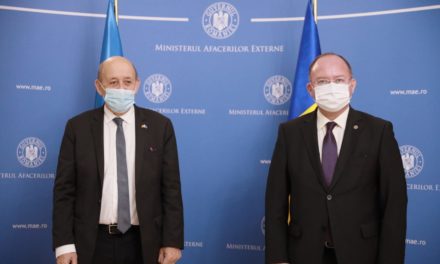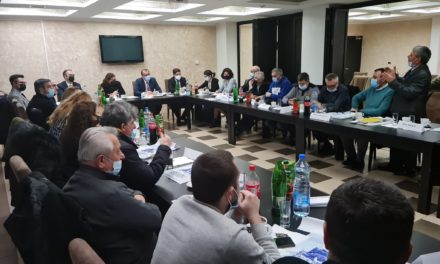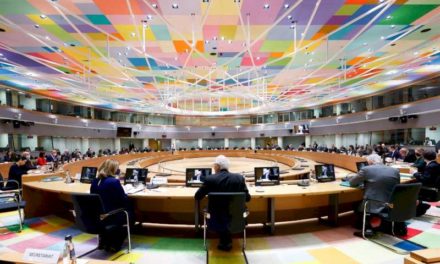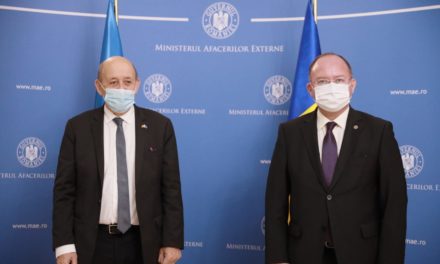Thank you so much, Chairman Wicker,
Distinguished Senate and House Members, the US Commission on Security and Cooperation in Europe,
Deputy Secretary General Geoană,
Mr. Mayor,
Mr. Chair of the County Council,
Ambassadors,
Members of Parliament,
Your Excellencies,
Dear colleagues,
It is my honor and pleasure to welcome you all to Romania and to the city of Constanța, which is the main Port at the Black Sea and very close to the strategic air base Mihail Kogălniceanu – M.K., as we call it.
I want to thank the Commission for the leadership and bi-partisan support in keeping a sharp focus on the Black Sea, on the threats on, and in the proximity of the Eastern Flank of NATO, on the importance of a strong transatlantic link and, most importantly for us, on strengthening our vibrant Strategic Partnership between Romania and the United States. All these are gaining in importance, considering the threat that Russia’s illegal, unprovoked and unjustified aggression in Ukraine and the Black Sea poses to the European, the Euro-Atlantic and global security, peace and stability.
I’m honoured to co-chair this event dedicated to the timely topic of the strategic importance of the Black Sea for the security and stability of Romania, of the region and of the entire year Euro-Atlantic community, including the United States.
I fully welcome this initiative of the Commission. In 1997, Romania and the United State launched a Strategic Partnership designed to broaden and deepen all dimensions of our bilateral relationship, with a major focus on security cooperation and on Romania’s Euro-Atlantic integration.
Over the last 25 years, a key objective of our bilateral Strategic Partnership has been to act as partners in enhancing our joint security and promoting the democratic and economic development of the Black Sea region. The continuation of common decisive action in this regard, at bilateral and multilateral level, is more relevant than ever.
Romania is the NATO ally and EU member state with the longest border with Ukraine, so we have an acute sense of the threats the Euro-Atlantic space is facing, as a consequence of the illegal war of Russia against Ukraine. No Allied waters are directly threatened by Russia the way the Romanian Black Sea waters are. Here in Constanța, and all along the Black Sea coast, lies the first line of defence for the Euro-Atlantic community and the first line of support for our partners in Ukraine, the Republic of Moldova and Georgia.
Romania has constantly warned of the rising threat posed by Russia in the Black Sea, after the illegal annexation of Crimea. The Black Sea is and will remain a launchpad for Russian aggression and military activity.
Beginning with his Munich Speech in 2007, the conflict in Georgia in 2008, the first invasion of Ukraine in 2014 and the illegal annexation of Crimea, President Putin’s efforts to undermine international security have turned bolder and more overt. Each act of aggression was built on the previous one, culminating with his all-out attack against Ukraine.
The Euro-Atlantic community has gradually come to the uncomfortable conclusion that, under President Putin, Russia is not the reliable, constructive or at least predictable partner we were looking and hoping for. So, the new Strategic Concept we adopted the day before yesterday in Madrid states the obvious, as proposed by Romania and other allies: that Russia is the most significant and direct threat to the Euro-Atlantic security.
The war in Ukraine has fundamentally changed the security parameters we are working with. But the Euro-Atlantic community has reacted in a robust and united manner, and this is our main strength and advantage. We are more united than ever in defending our citizens, our territories, our values and the rules-based international order. And Romania is a reliable and active partner and ally.
The historical decisions taken these days at the NATO Summit in Madrid reflect a clear message regarding Black Sea security: not only is it an integral part of Euro-Atlantic security, but it is recognized for the first time in a Strategic Concept of the Alliance as a region of strategic Allied importance.
Transatlantic coordination in face of Russia’s aggression has been impeccable, and it must continue to be so. The Bucharest 9 Format, launched by President Iohannis of Romania and President Duda of Poland has had, in this context, a clear added-value in ensuring coordinated and cohesive approaches among the nine Allies on the Eastern Flank, but also at transatlantic level, regarding the security of our Alliance as a whole.
If President Putin hoped to divide us, he failed. To the contrary, we’ve shown the complete opposite of what he was trying to achieve: there is renewed drive and commitment to consolidate European strategic resilience, with the United States’ support. The European Council granted Ukraine and the Republic of Moldova the candidate status, and also recognized Georgia’s European perspective. Finland and Sweden have started the process of joining NATO and we have to also see very clearly that the decisions we have taken to make our posture of deterrence and defence stronger and more efficient are extremely relevant for us all.
Our strong, multifaceted support for Ukraine should only grow in quantity and complexity. All these show that we are doing what is right. Our support, Romania’s support for Ukraine, has been manifold since the first day of the aggression. We helped more than 1.4 million Ukrainian citizens who crossed our borders, mostly women and children. We provided them facilities for educational needs and for integration in our labor market. In addition, an international hub for distribution of humanitarian assistance in Suceava is functioning at full capacity.
I also want to say a few words about the food insecurity generated by Russia – I am sure we will elaborate further on this topic. Romania is actively involved in facilitating the transit of Ukraine exports and in serving as a hub for its grain. We are working to find the best solutions to ease the transit here, where we find ourselves, through the Black Sea Port of Constanța, and our ports on the Danube, but also on our railways.
Romania also calls for the involvement of all relevant actors, of a Coalition of the willing who could support the international effort to create “blue corridors” ensuring safe maritime transportation in the Black Sea.
Now going back to the deliverables of the NATO Summit, I want to underline that these are consolidating our posture of deterrence and defence on the Eastern Flank, with a shift of our posture from Forward Presence to Forward Defence. And this is for the first time mentioned – in the Summit Declaration of Madrid.
Through the New Strategic Concept we have shaped a long-term vision, putting collective defence and Article 5 at the core of our actions and implementing a significant transformation of our deterrence and defence posture. We have seen the consolidation of NATO’s posture on the whole of the Eastern Flank in a unitary and balanced manner, as Romania has been advocating for quite some years, especially in the Southern part of the Eastern Flank, at the Black Sea – and this was one of the main objectives promoted by President Iohannis in Madrid and in the previous Summit, in March.
The decision announced by President Biden to enhance the US military presence in Romania is also a strong signal of US commitment to Allied and regional security, and we are very grateful to the United States and the American people for this!
From now on, Russia’s continued aggression in our region will be met by a stronger NATO and US deterrence and defence. So, I am convinced that our discussions today will yield new opportunities as far as the cooperation between us is concerned, building on the historical decisions taken throughout the past four months and, most importantly, at the NATO Summit in Madrid, which ended yesterday.
So, thank you so much and, Mr. Chairman, back to you.







